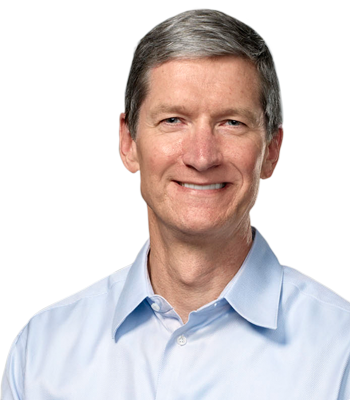Cook's comments came in response to a question during his company's quarterly earnings conference call, in which he was asked about Apple's relationship with its carrier partners. Recently, some carriers have expressed unhappiness with paying for high subsidies associated with the iPhone when compared to competing Android-based smartphones.
"At the end of the day, the carriers want to provide their customers with what their customers want to buy," Cook said Tuesday. "And so the most important thing for Apple by far is to continue making the best products in the world."
The CEO went on to note that the total subsidy that carriers pay is "fairly small" when compared with the monthly payments that carriers collect from wireless subscribers. And in order to provide the iPhone and other smartphones at a subsidized price, carriers lock customers into 24-month contracts to recoup those costs and turn a profit.
Though the iPhone can be had for as little as free with a new two-year contract, the average selling price of the iPhone remains over $600, thanks to those subsidies that carriers offer to bring the cost of the handset down.
But although the iPhone may carry higher subsidy costs than some competing smartphones, Cook noted that the iPhone also has lower churn rates, a term the wireless industry uses to describe the number of customers who leave a carrier in a given time period.
In addition to being more loyal to carriers, iPhone users are also more likely to have a tablet, like an iPad, Cook said. Because of that, he believes that iPhone users will be more likely to adopt the new shared data plans to which wireless providers are transitioning.
Finally, Cook also noted that Apple's engineering teams work closely with carrier partners in an effort to find the most efficient way of handing data. He said he believes the iPhone is the market's most efficient smartphone in terms of data use and bandwidth congestion.
"We're going to focus on making the best product," Cook said, "and I think the carriers will be very motivated to make sure they provide them to the customers."
 Neil Hughes
Neil Hughes







-m.jpg)






 Charles Martin
Charles Martin

 Malcolm Owen
Malcolm Owen
 William Gallagher
William Gallagher

 Christine McKee
Christine McKee
 Wesley Hilliard
Wesley Hilliard








38 Comments
The story linked that supposedly proves carrier "unhappiness" contains a fact-free assertion by an analyst. Here's the quote:
Walter Piecyk's opinion isn't the basis for proof of anything.
I look forward to the day Apple decides to buy up the available white space from the FCC at auction for use in future iPhones and iPads. I'd rather pay Apple for wireless service than the scum they currently deal with.
Now I understand why us super-senior retiree's don't get a subsidized smart phone! We won't live long enough for them to turn a profit.
Of course he's 'downplaying' it... That's part of his job.
[RIGHT][/RIGHT] What Tim Cook doesn't say is that Apple's high subsidy demands are eventually paid for by us customers (via higher monthly wireless fees).
[quote name="AppleInsider" url="/t/151495/tim-cook-downplays-carrier-concerns-over-high-iphone-subsidy-costs#post_2153168"] The CEO went on to note that the total subsidy that carriers pay is "fairly small" when compared with the [B]monthly payments[/B] that carriers collect from wireless subscribers. And in order to provide the iPhone and other smartphones at a subsidized price, carriers lock customers into 24-month contracts to [B]recoup those costs and turn a profit[/B].[/quote] The customer pays $200 for a brand new iPhone... while the carrier covers the other $450. That might seem high... but hold on... The carrier then collects $2000 over 2 years for every iPhone customer they have. And they're still not happy? Guess what, carriers... you sell a service. Your monthly plans are ridiculously high... you make billions of dollars every quarter... so shut up!